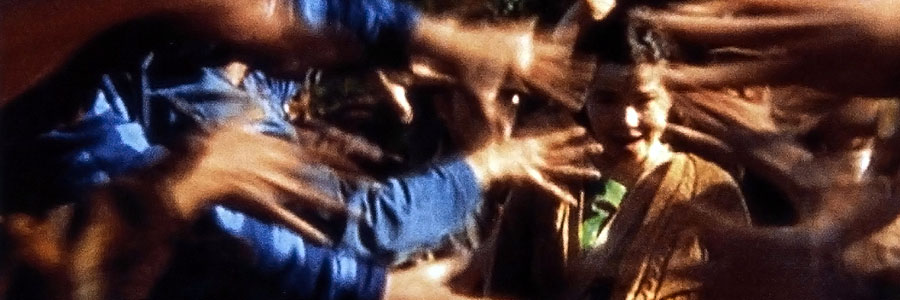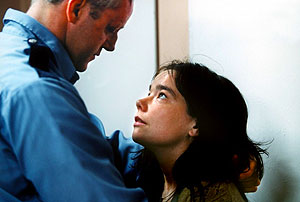
Dancer In The Dark

DANCER IN THE DARK (MOVIE)
Fine Line Features
Original release: October 6th, 2000
Running time: 140 minutes
Country of origin: Denmark
Original language: English
Writer and director: Lars von Trier
Composer: Bjork
Cast: Bjork, Vladica Kostic, Catherine Denevue, Peter Stormare

I resisted watching Dancer In The Dark for longer than I should have. Lars von Trier’s films have a way of subliminally getting under my skin for long periods of time and I love him for it. But being familiar with his more recent work – Melancholia (2011), Antichrist (2009) and Dogville (2003) – in which female exploitation is a perpetual theme, I was scared to waltz into Dancer. It’s especially not easy to watch brutal physical and emotional manipulation of strong female leads, often at the hands of men, when you identify as a feminist.
However, my fears proved to be unfounded. The recurring theme is handled differently here in a way that holds its own.
The story revolves around Selma (Icelandic pop sensation Bjork) who’s a Czech immigrant living in Washington state in the 1960s with a young son Gene
(Vladica Kostic). Selma has a secret – she has a degenerative disease that’s causing her to completely lose her eyesight in the coming months. To save her son from the same fate, she’s been saving her meagre earnings from a factory job to pay towards his operation. The big machines at the factory combined with her poor eyesight mean she’s not the most efficient worker.
Her co-worker and friend Kathy (Catherine Denevue) watches out for Selma, especially when she drifts into her daydreaming bouts. Selma loves musicals – because she believes nothing bad ever happens in them – and uses them as a crutch to escape the many drudgeries of her daily life. Indeed, the movie’s opening scene has Selma playing the part of Maria in a rehearsal for a local production of The Sound Of Music, which she’s involved with for a majority of the film. Selma sticks out in a world of adults due to her trusting and almost childlike nature. Her near-blindness adds to her vulnerability that others respond to by indulging her – Kathy, who she affectionately calls Cvalda, explains the goings-on of the screen to Selma whenever they go to the movies to watch musicals.

There’s also a love interest in the form of Jeff (Peter Stormare) who patiently waits for Selma outside the factory every day hoping she’ll agree to hitching a ride with him. Selma and Gene live in a trailer on the property of a local cop Bill (David Morse) and his wife Linda (Cara Seymour). Bill and Linda appear to be well-off but Bill confides in Selma that he’s broke and putting up a façade for the sake of his clueless shopaholic wife. In return, Selma shares her secret about her blindness and saving for Gene’s operation. It’s from here that the film takes on a von Trierian flavor.
Bill tries to coerce Selma into loaning him some money. When she refuses he takes advantage of her poor sight and steals her savings. What follows next is a surprising and gut-wrenching turn of events which result in Bill’s death and Selma being given the death penalty on account of murdering him.
One of the first things that strikes us about Dancer In The Dark is the usage of a hand-held video camera which gives it an element of realism. It also adds to the plausibility of some scenes, especially towards the beginning, that seem as disjointed and awkward as life can sometimes be. That the film is a musical set to the tune of  Bjork’s offbeat style is another surprise. It’s almost impossible to evaluate the musical aspect of the film without removing the bias of how you may feel about her music. I’m not her biggest fan but somehow it all just works. The songs grew on me on my second viewing and I almost didn’t notice what I’d earlier considered their jarring effect.
Bjork’s offbeat style is another surprise. It’s almost impossible to evaluate the musical aspect of the film without removing the bias of how you may feel about her music. I’m not her biggest fan but somehow it all just works. The songs grew on me on my second viewing and I almost didn’t notice what I’d earlier considered their jarring effect.
Women are often mysticized and venerated in von Trier’s films. Here too, Selma’s unwavering goodness is exemplified through her sense of motherhood in defying all odds to provide for her son’s future, and morality in keeping Bill’s secret despite his betrayal (“Mum’s the word, remember?”). Some of my favorite scenes in the film revolve around her maternal strength of character: when she argues with Gene about keeping the expensive bike which Bill and Linda got him as a birthday gift (“I’m just not that kind of mother, Gene”) — his counter argument is endearingly funny in its simplicity and form (“Why can’t you be that kind of mother?”).
When Jeff visits Selma in prison and asks her why she chose to have Gene knowing he’d inherit her disease (“I just wanted to hold a child in my arms”), we understand his anguished reaction over losing the woman he loves. And the heartbreaking scene of sacrifice where Selma tells the director Samuel (Vincent Paterson in a wonderful supporting role) of her decision to quit the play (“Yes, I’ve just been pretending this whole time”) – I love the reassuring kiss he plants on her forehead (“You’ll always be my perfect Maria”).
Some might argue that von Trier’s treatment of Selma is not veneration but manipulation. I struggled with this too. As a stand-alone film, that might be a fair statement but when I compare it to his larger body of work I can’t help but feel that he  downplayed his general tendency to put women through the wringer here. There are some very powerful moments in this film that different people will respond to differently. That’s what makes this film so special.
downplayed his general tendency to put women through the wringer here. There are some very powerful moments in this film that different people will respond to differently. That’s what makes this film so special.
Life is rarely black and white. Its grayness is depicted very well through the dichotomy of Bill’s humanity in trying to falsely implicate Selma in theft and his murder. He knew what he was doing was wrong but also wanted to provide for his wife’s future through the money his life insurance would fetch in the event of his death. I appreciated that stealing from his friend was not his first recourse; not that suicide is the way to go either but Bill’s struggle between his ego and sense of friendship is a good example of how flawed and complex we as individuals often are.
In a wonderfully supported ensemble cast I’m convinced Bjork was the right choice for this role. She makes us root for Selma until the very end even as she sings happy songs from The Sound Of Music in her darkest hour. Despite the sudden and gritty end, the many positives from her life – Kathy’s friendship, Jeff’s unconditional love, her dream of Gene’s operation having been realized in the end – seem to placate the injustice done to Selma and impart a positive sensitivity overall. It’s this sensibility that distinguishes Dancer from some of von Trier’s other films where I wasn’t sure the protagonist was necessarily in a better place at the end of the story.
As much as it pained me to see Selma’s last song cut short by the gallows it also beautifully illustrated the lengths we’re prepared to travel in the name of love.

Richa Rudola
Richa developed an interest in films while attending a weekly movie club as therapy during her pursuit of a graduate degree in Statistics. The interest evolved into a passion for the visual storytelling medium and she’s currently working on her first screenplay. She prefers films that view the world from a sociological lens and tell stories of courage.
Richa tries to use films as a means for becoming a better person and especially appreciates a film that proves her initial gut instinct wrong. Some of her favorites are All About My Mother, Rosemary's Baby, Eternal Sunshine Of The Spotless Mind, Antichrist, In The Mood For Love, Omkara, Andaz Apna Apna and Ponette.
You can follow her on Twitter at @richarudola.
© 2022 STATIC MASS EMPORIUM . All Rights Reserved. Powered by METATEMPUS | creative.timeless.personal. | DISCLAIMER, TERMS & CONDITIONS
HOME | ABOUT | CONTACT | TWITTER | GOOGLE+ | FACEBOOK | TUMBLR | YOUTUBE | RSS FEED
CINEMA REVIEWS | BLU-RAY & DVD | THE EMPORIUM | DOCUMENTARIES | WORLD CINEMA | CULT MOVIES | INDIAN CINEMA | EARLY CINEMA
MOVIE CLASSICS | DECONSTRUCTING CINEMA | SOUNDTRACKS | INTERVIEWS | THE DIRECTOR’S CHAIR | JAPANESE CINEMA





